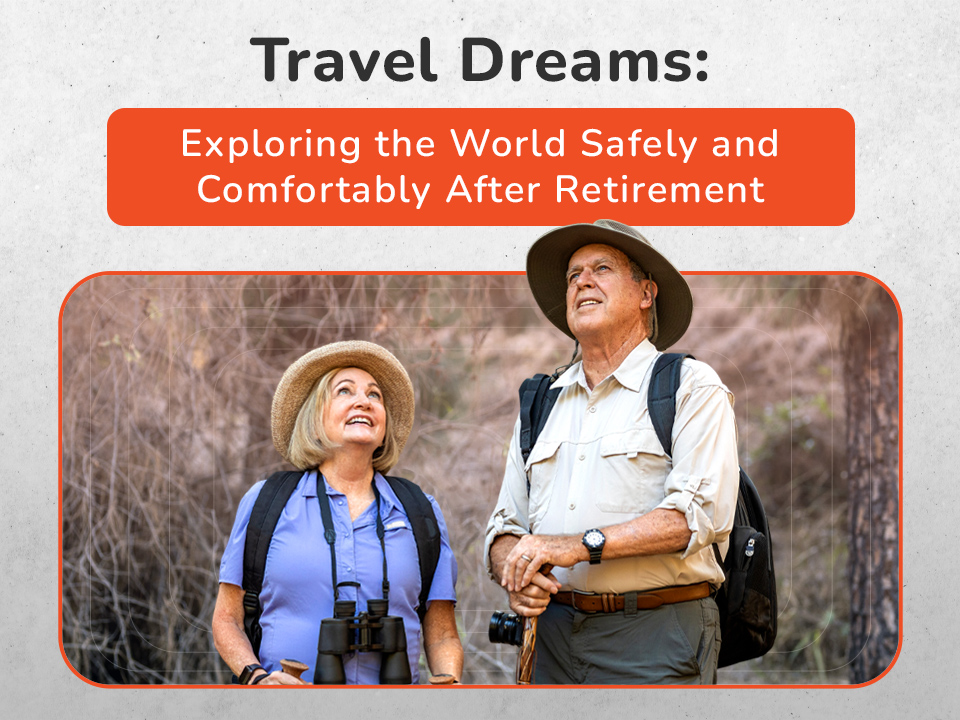Retirement is not just an end to a career; it’s a gateway to new adventures and experiences. For many, it’s the perfect time to explore and travel, which might have been a long-held dream. This article aims to be your guide, helping you navigate the exciting yet sometimes daunting world of travel in your golden years. From choosing the right destinations to managing health and safety, we cover everything you need to know to make your travel experiences as enjoyable, safe, and comfortable as possible. Let’s embark on this journey together, turning your travel dreams into reality.
Planning Your Trip
When planning your post-retirement travels, it’s essential to consider several key factors to ensure a safe and enjoyable journey. Researching and choosing senior-friendly destinations is the first step, ensuring the locations have the necessary amenities and accessibility. Additionally, securing comprehensive travel insurance is crucial to providing peace of mind and protection against unexpected health emergencies or travel issues.
Here are the critical considerations for trip planning:
- Research Destinations: When embarking on post-retirement travels, meticulous planning is essential to ensure a safe and enjoyable journey. Start by researching especially senior-friendly destinations, ensuring easy accessibility and adequate healthcare facilities. This careful selection of destinations is crucial for a comfortable travel experience.
- Travel Insurance: Next, securing comprehensive travel insurance is vital. Opt for a plan that thoroughly covers medical emergencies, particularly for pre-existing conditions, offering peace of mind during your travels.
- Budgeting: Develop a detailed budget plan, accounting for all possible expenses to avoid financial stress during your trip. Consider costs such as transportation, accommodation, food, entertainment, and souvenirs. Setting aside some extra funds for emergencies is also a good idea.
- Health Precautions: Schedule a thorough health check-up with your doctor before traveling. Discuss any existing medical conditions and medications you’re taking. Ensure that you have an adequate supply of prescription medications for your trip. If you plan to travel internationally, check if any vaccinations or health precautions are recommended or required for your destination.
- Local Customs and Language: Learn about the local customs, traditions, and basic language phrases if traveling to a foreign country. Understanding and respecting the local culture will enhance your travel experience and help you connect with the local people.
- Accessibility: Research the accessibility of your chosen destinations and accommodations. If required, ensure that hotels, restaurants, and tourist attractions have facilities to accommodate your mobility needs.
- Travel Documents: Ensure that all your travel documents, including passports, visas (if necessary), driver’s licenses, and any required permits, are up-to-date and easily accessible. Make copies of these documents and store them separately in case of loss or theft.
By thoroughly preparing and considering these factors, you can make your retirement travels both enriching and trouble-free. This preparation will allow you to fully immerse yourself in the new experiences and cultures you encounter while ensuring your safety and well-being throughout your journey.
Choosing the Right Accommodations
Selecting the right accommodations is vital for seniors to ensure a comfortable and hassle-free travel experience. It’s not just about finding a place to stay; it’s about finding a ‘home away from home’ that caters to your needs as a senior traveler.
Here we explore the key factors in choosing accommodations:
- Accessibility: When choosing accommodations, prioritize those with senior-friendly features like elevators, handrails, and easily accessible bathrooms. This consideration can significantly affect your overall comfort and mobility during your stay.
- Comfort: Look for accommodations that offer the comforts of home. This could mean a place with a cozy kitchenette, comfortable seating areas, and a bed that ensures a good night’s sleep.
- Location: The location of your accommodation is key. Opting for places near medical facilities, popular tourist attractions, and restaurants can save time and reduce travel-related stress.
- Quiet Environment: A restful environment is crucial for a rejuvenating stay. Consider accommodations located in quieter areas to ensure your peace and relaxation.
- Customer Reviews: Checking reviews from other senior travelers can provide valuable insights into the suitability of the accommodation. These reviews often highlight aspects that may be particularly relevant to older travelers.
- Transport Connectivity: Finally, ensure that your chosen accommodation has good access to public transportation or shuttle services, as this can greatly enhance your mobility and independence during your travels.
Considering these factors, you can find accommodations that meet your basic needs and enhance your overall travel experience, allowing you to focus on enjoying your journey.
Packing Essentials

Packing for travel during retirement is an art that combines practicality with personal comfort. It’s more than just throwing items into a suitcase; it involves thoughtful preparation to ensure every essential is included, especially those crucial for health and comfort.
Here are the essentials to include in your packing:
- Medications: It’s imperative to pack enough medication for your entire trip, with a surplus to cater to unexpected delays or extensions. Organizing them in a way that’s easily accessible and clearly labeled is also crucial.
- Comfort Items: Comfort is key while traveling. Packing items like a neck pillow for long journeys, a favorite book for leisurely afternoons, or even a small item that reminds you of home can make a significant difference in your travel experience.
- Emergency Contacts: Having a comprehensive list of emergency contacts, including family, friends, and your healthcare provider, readily available is essential. This list should be kept in a place that is both secure and easily accessible.
- Travel Documents: Keeping travel documents organized, such as passports, insurance papers, and itineraries, ensures smooth transit and service access. Consider using a travel document organizer for added convenience.
- First Aid Kit: A basic kit is invaluable for addressing minor health issues. This kit can include band-aids, antiseptic wipes, pain relievers, and any other personal medical necessities.
- Appropriate Clothing: Selecting clothing suitable for the destination’s climate and planned activities can enhance comfort. This includes comfortable walking shoes, weather-appropriate attire, and perhaps a special outfit for evening events.
Packing these essentials ensures you’re well-prepared for your journey, making your travel both comfortable and enjoyable, allowing you to focus on the joys of exploration and new experiences.
Read More: Aging Gracefully: 10 Key Steps for a Fulfilling and Healthy Life
Staying Healthy on the Road

Maintaining health on the road is paramount for retirees embracing travel. It involves more than just keeping up with medication; it’s about ensuring overall well-being to enjoy the journey fully.
- Regular Medication: Adhering strictly to your medication regimen is vital. It’s important to plan ahead, ensuring you have enough supply and know any time zone changes that might affect scheduling.
- Stay Hydrated: Proper hydration is key, especially in new climates. It’s wise always to carry water and monitor your intake to prevent dehydration, a common issue for travelers.
- Eat Healthily: Opt for balanced meals that provide nutrition and energy. While indulging in local cuisine is part of the travel experience, it’s important to maintain a balance with healthy choices.
- Moderate Activity: Incorporating gentle physical activities, like leisurely walks or simple stretches, can keep you active while respecting your body’s limits.
- Rest Adequately: Getting sufficient rest is crucial for recovery and energy. Prioritize comfortable accommodations and take short breaks during activities to recharge.
- Be Mindful of New Foods: Experimenting with local dishes is exciting, but be cautious, especially if you have dietary restrictions or a sensitive stomach.
By keeping these points in mind, you can ensure a healthy and enjoyable travel experience, balancing the excitement of exploration with your well-being needs.
Enjoying the Experience
Embarking on retirement travels is a journey into a world of new experiences enjoyed leisurely and comfortably. This phase of life offers the luxury of time, allowing you to immerse yourself in each destination’s unique culture deeply. Engaging in local activities, participating in vibrant festivals, and exploring rich historical sites can provide an authentic glimpse into the lives and traditions of the places you visit.
- Cultural Activities: Delve into the heart of each destination by embracing local culture, which can be a gateway to understanding and appreciating the world’s diversity.
- Stay Connected: Regularly touching base with family and friends, sharing your stories and experiences, helps maintain your relationships and provides a sense of comfort and connection to home, even when your miles away.
- Take it Easy: It’s important to remember that retirement travel’s essence is relaxing and enjoying. Listen to your body, take breaks when needed, and savor each experience without the rush to see everything.
- Capture Memories: Documenting your journey through photographs or a travel journal preserves your memories and allows you to reflect on and share these experiences with others for years.
- Meet New People: Interaction with locals and fellow travelers can add a rich layer of social engagement to your journey, offering opportunities for friendship and deeper cultural understanding.
- Stay Open-Minded: Approach each new experience with curiosity and openness. Being receptive to different ways of life and new ideas can profoundly enrich your travel experience.
These practices help create a travel experience that is not just about visiting new places but about fully living and appreciating each journey moment, creating a tapestry of memories that enrich your retirement years.
Conclusion
In conclusion, traveling after retirement opens possibilities, enriching life with new experiences and memories. By planning carefully and taking necessary precautions, seniors can confidently embark on adventures, exploring the globe safely and comfortably. It’s a time to indulge in the wanderlust that may have been put on hold during the working years, discovering diverse cultures, landscapes, and activities. Embrace this golden opportunity to see the world in all its wonder, creating lasting memories that enrich the retirement years.






